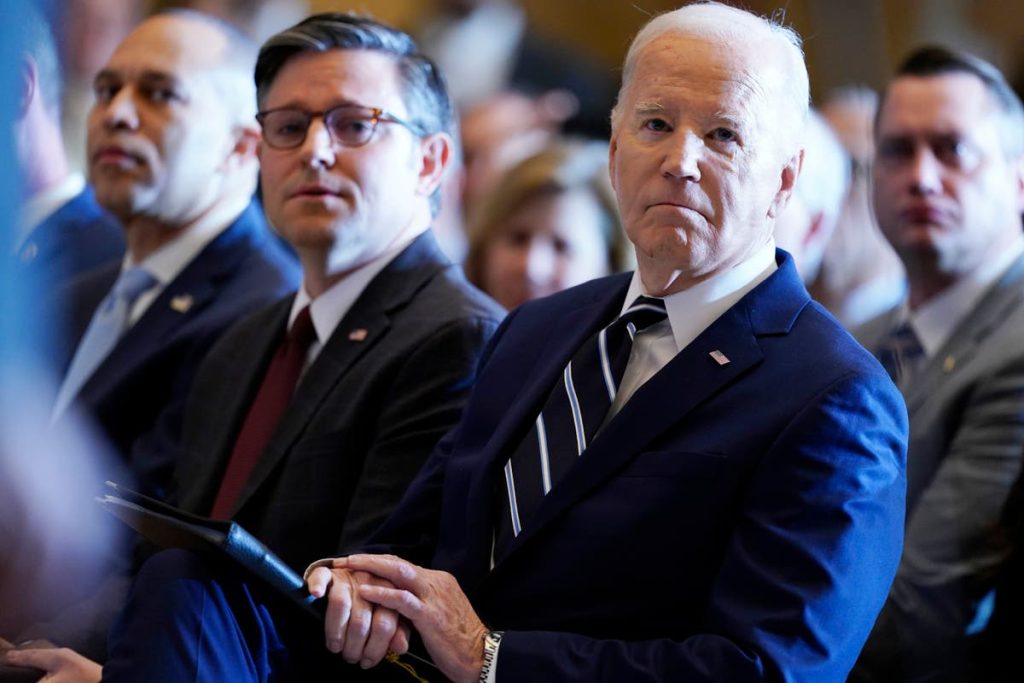President Joe Biden told Congressional leaders they have “a lot of work to do” in order to enact legislation that will keep the federal government operating for the rest of this fiscal year and fund “urgent” defence assistance for Ukraine, Israel and other American allies.
Mr Biden told House and Senate leaders in the Oval Office on Tuesday morning that the consequences of a failure to include the defence spending package in any deal to keep the government open would be “dire” for America’s Ukrainian allies based on conversations with other Group of Seven leaders.
He also urged passage of the supplemental funding bill because it includes needed aid for Israel and humanitarian assistance for the Palestinian civilian population in Gaza, and stressed that Congress has there responsibility of funding the government and preventing the economic damage that a shutdown would cause.
The meeting between Mr Biden, Vice President Kamala Harris, House Speaker Mike Johnson, Minority Leader Hakeem Jeffries, Senate Majority Leader Chuck Schumer and Senate Minority Leader Mitch McConnell started at 11.30am ET and wrapped nearly 90 minutes later.
It was a last-ditch attempt to push them towards keeping the entirety of the federal government funded past the end of this week despite an ongoing impasse over federal budgeting caused by Republican hardliners in the House.
Mr Schumer, a New York Democrat, called the session “productive” and said he and his colleagues “are making good progress” towards a solution.
He added that Mr Johnson, a Louisiana Republican, “said unequivocally he wants to avoid a government shutdown”.
“There’s a little back and forth on different issues that different people want. But I don’t think those are insurmountable,” he said.
Currently, the government is operating on Fiscal Year 2023 funding levels set by a Continuing Resolution — a bill which extends a prior year’s budgeting as a temporary measure.
The stopgap bill was passed earlier this year to give the Republican-led House of Representatives time to work out internal disputes over how to approach budgeting for the current fiscal year, which started on 1 October.
Funding for a number of government departments such as transportation, agriculture and veterans’ affairs is set to run out at midnight on Friday 1 March. Funding for the remainder of the federal government will run out at midnight on the following Friday 8 March.
Making things worse, if the Republican-led House and Democratic-controlled Senate cannot agree on legislation to fund the government for FY2024 by 1 April and instead choose to continue FY2023 spending for the remainder of this year, a budgeting agreement signed into law by Mr Biden after negotiations with former House Speaker Kevin McCarthy will mandate a one per cent cut in all federal spending.
President Joe Biden is set to meet with the top House and Senate leaders
(Getty Images)
The across-the-board cut was meant to be an incentive for Congress and the White House to agree on a budget for this year, but an increasing number of Republican hardliners now want to force the cuts as a way of acheiving a measure of victory on cutting federal expenditures by hook or by crook.
Yet it’s unclear whether even a so-called “clean” budget bill — either a new FY2024 budget or a FY2023 CR — can get past the lower chamber.
While Mr Schumer and Mr McConnell have both called for the House to pass legislation without “poison pills” that have no chance of getting through the Democratic-controlled upper chamber, Republicans are wanting to use the budget process to extract policy concessions from the White House.
Also at issue is the fate of the multi-billion dollar supplemental appropriations package sought by Mr Biden, Mr Schumer and Mr McConnell to fund defence needs for US allies in Israel, Ukraine and Taiwan.
While the White House and Senate leaders are in favour of the package and a majority of the House supports it as well, enough Republicans under the thrall of former president Donald Trump have fought against sending any funds to Ukraine because continuing to aid Kyiv would grant Mr Biden a win on foreign policy in an election year.
Mr Schumer told reporters the discussion about Ukraine funding was “one of the most intense I have ever encountered in my many meetings in the Oval Office,” and said he, Mr Biden, and the other Congressional leaders understood how “vital” it is for Congress to continue funding Kyiv’s defence against Russia.
He said the US “could not afford to wait a month or two months” because Ukraine “would in all likelihood lose the war”.
“Nato would be fractured at best, allies would turn away from the United States, and the boldest autocrats of the world, Putin, Xi, the presidents of North Korea and Iran would be emboldened,” he said.



